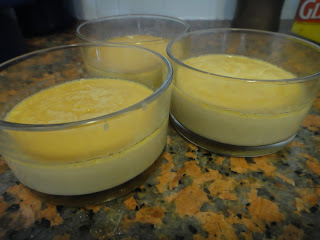Yay! I love creme brulee but have never tried to make it before! Making it Primal was interesting. I looked up a few recipes for both traditional creme brulee and also a Primal version (thus stumbling onto a great new Primal recipe blog written by a few women, check them out here!) before deciding what to do. I decided to stick with the heavy cream versus the coconut milk, and simply swapped the granulated sugar for some coconut palm sugar.*
The Egg Custard
- 6 egg yolks
- 6 tablespoons of coconut palm sugar
- 1 1/2 cups chilled whipping cream
- 3-4 tablespoons of coconut palm sugar for topping
Preheat your oven to 275 degrees.
To make this basic egg custard, one must learn how to make a proper Bain-Marie, or hot water bath. The egg custard has to reach an internal temperature of 175 to be done, but they will burn a long time before that and be more like an egg muffin if you don't place them in a hot water bath.
To make your hot water bath, you will need ramekins for the custard and then a large glass baking dish for your hot water bath. Butter the ramekins and set them into your baking dish (to ensure that they fit and that the water bath will be able to cover them almost completely).
Break open your eggs and carefully separate the yolks from the egg whites. To do this, I open them over a "discard" bowl, and carefully transfer the egg yolk from one side of the cracked shell to the other, losing the egg white a little bit more with every transfer. This move requires finess, because you do NOT want to break the yolk until you've separated as much of the whites off of the egg as possible.
Once you've separated the yolks, put them in a mixing bowl. Beat the eggs until frothy bubbles form. Then add your milk and the coconut palm sugar. Stir until the coconut palm sugar is completely dissolved. Pour the custard mixture into the buttered ramekins, keeping the custard at least 1/2 inch from the tops of the ramekins.
Bring a few cups of water to a simmer on the stovetop. Set your glass baking dish in your oven, with the rack placed in the middle. Carefully pour the hot water into the glass baking dish, bringing the water level up to the level of your custards inside their ramekins. The hot water protects the custard and keeps it smooth, so make sure to not leave any of your custard exposed!
It took 45 minutes for my custards to cook, but the cooking time depends on the size of your ramekins. After 30 minutes in the oven, I would check with a toothpick or cooking thermometer every 5 minutes to make sure you don't overcook your custards. You want the toothpick to come out mostly clean - this will ensure that the custard is smooth and creamy, not dried out or crispy. The tops of the custards should be set and the custard should jiggle a little when it is finished.
Very, VERY carefully pull the ramekins out of the hot water and cover them with some plastic wrap. Stick them in the fridge for at least 4 hours.
When it is time to finish off your creme brulee, pull the ramekins out of the fridge. If condensation has collected on the top of your custards, lightly soak it up with the corner of a paper towel. Sprinkle the 4 tablespoons of coconut palm sugar on top of the custards and either use your cool culinary torch to burn the sugar or if you don't have a torch, place your ramekins 6 inches below the broiler for 4 to 6 minutes or until the coconut palm sugar bubbles and turns golden brown. Serve a few minutes later, so the ramekins aren't too hot to the touch.
These desserts are such a big hit with guests!
* While coconut palm sugar is a decent Primal sugar alternative (technically we aren't supposed to use any refined sugars, so this meal is "cheating" a little bit since it is so...sweet), I try not to purchase or use it too often due to the methods needed to make the coconut palm sugar. I don't want to have the coconut tree population destroyed because farmers are switching their trees to sugar-producing trees. You can read more about it here if you'd like to. Part of the Primal lifestyle includes sustainable living, and unfortunately coconut palm sugar is not currently a sustainable industry. I would not want coconut oil to become a super expensive, super scarce commodity!





No comments:
Post a Comment